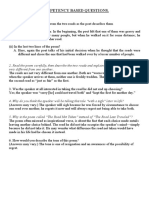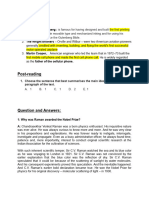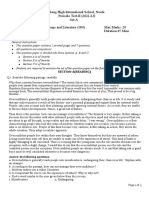100%(1)100% found this document useful (1 vote)
11K viewsConversation Between Two Friends About Pollution
Conversation Between Two Friends About Pollution
Uploaded by
058 PAUL MICHAEL SKaran and Paul discuss the serious air pollution problem in Dindigul, especially during winter months. Karan bought an N90 pollution mask for 2,500 rupees that can be used for hundreds of hours, unlike cheaper masks that only last a few uses. Residents also need to control pollution by stopping burning of waste and limiting construction activities when forbidden. While some efforts have been made, air quality often remains poor with relief only during rainy seasons, and improving conditions remains a distant dream.
Copyright:
© All Rights Reserved
Available Formats
Download as DOCX, PDF, TXT or read online from Scribd
Conversation Between Two Friends About Pollution
Conversation Between Two Friends About Pollution
Uploaded by
058 PAUL MICHAEL S100%(1)100% found this document useful (1 vote)
11K views2 pagesKaran and Paul discuss the serious air pollution problem in Dindigul, especially during winter months. Karan bought an N90 pollution mask for 2,500 rupees that can be used for hundreds of hours, unlike cheaper masks that only last a few uses. Residents also need to control pollution by stopping burning of waste and limiting construction activities when forbidden. While some efforts have been made, air quality often remains poor with relief only during rainy seasons, and improving conditions remains a distant dream.
Copyright
© © All Rights Reserved
Available Formats
DOCX, PDF, TXT or read online from Scribd
Share this document
Did you find this document useful?
Is this content inappropriate?
Karan and Paul discuss the serious air pollution problem in Dindigul, especially during winter months. Karan bought an N90 pollution mask for 2,500 rupees that can be used for hundreds of hours, unlike cheaper masks that only last a few uses. Residents also need to control pollution by stopping burning of waste and limiting construction activities when forbidden. While some efforts have been made, air quality often remains poor with relief only during rainy seasons, and improving conditions remains a distant dream.
Copyright:
© All Rights Reserved
Available Formats
Download as DOCX, PDF, TXT or read online from Scribd
Download as docx, pdf, or txt
100%(1)100% found this document useful (1 vote)
11K views2 pagesConversation Between Two Friends About Pollution
Conversation Between Two Friends About Pollution
Uploaded by
058 PAUL MICHAEL SKaran and Paul discuss the serious air pollution problem in Dindigul, especially during winter months. Karan bought an N90 pollution mask for 2,500 rupees that can be used for hundreds of hours, unlike cheaper masks that only last a few uses. Residents also need to control pollution by stopping burning of waste and limiting construction activities when forbidden. While some efforts have been made, air quality often remains poor with relief only during rainy seasons, and improving conditions remains a distant dream.
Copyright:
© All Rights Reserved
Available Formats
Download as DOCX, PDF, TXT or read online from Scribd
Download as docx, pdf, or txt
You are on page 1of 2
Conversation Between Two Friends About Pollution
paul: Hi Karan, how are you doing?
karan: I am doing good. How about you?
paul: I am good as well. How are you dealing with Dindigil pollution?
Karan: It’s really terrifying, especially in winters. I recently ordered a pollution mask to decrease
the effect of pollution, but we cannot wear it all the time. But what we need to do at home?
paul: Air purifiers. Don’t they work well?
Karan: They do, but not everyone can afford it. Furthermore, would you want to operate them
for hours every day and many months?
paul: You have got a point. I’m also thinking to buy a pollution mask. What would you suggest?
Karan: I purchased an N90 mask for INR 2,500/-. I have examined the cheap ones as well, the
one that cost 20-30 rupees for a single piece, but they turn out to be more costly.
paul: More costly? How?
Karan: The cheaper ones can be best used for 2 to 3 times. Whereas, the one I am using can
be used for some hundred hours. So the value of cheap ones sums up fast. And also the cheap
ones are not as efficient as the N90 I am using in refining the pollutants. That’s important, right.
What’s the purpose of using a mask if it’s not cleaning the toxic pollutants?
paul: I Agree with you. Anything else on pollution respirators?
Karan: Prefer a mask with exhaling valves. Valves help you breathe easily, particularly when
you are out of breath after exercising or climbing stairs and stop the buildup of moisture.
karan: We have been inhaling the toxic air for the last few years. Do you envision any reduction
in pollution levels in near future, says this winter?
paul: I think it will be minimal at best. Vehicular contamination can be managed by taking the
fuel-inefficient, contaminating old vehicles off the roads, but will it happen. Who will bell the cat
to check stubble burning in the neighboring lands? The construction project is the easiest of the
three to control.
Karan: What about pollution from fireworks on Diwali?
paul: There have been some limitations on the use of crackers at least in Dindigul but
implementation is not easy. To be fair, I am not too concerned about crackers because their
impact is only for a few days. I am more bothered about the month-on-month high level of
pollution rising out of other circumstances.
Karan: I agree, but I think residents too have some part in controlling pollution. We can stop
people from burning polythene bags and other dangerous waste in winter. We can also reach
construction activities in our area during the period it is forbidden.
paul: Right. What we usually don’t pay attention to is the case that pollution, particularly in the
winter months is not just a Dindigul aspect. It seizes most of North India. The Air Quality Index
(AQI) of small cities such as Gwalior, Agra, and Lucknow often gets more critical than dindigul,
and they don’t get the same coverage in the national media as metro cities such as Dindigul do.
Karan: That’s correct. And pollution is imposing such a heavy toll on human life. I was reading
in the newspaper that India has the questionable distinction of most extinction because of
pollution and most of them are associated with air pollution. In 2021, more than 2.5 million
people died in India because of pollution.
paul: I too remember reading in the newspaper that the AQI in dindigul enrolled the satisfactory
zone for the first time in many months during the rainy season. Circumstances have come to
such a way that we have an exhalation of relief when the AQI goes from very poor to poor
category. Imagine, satisfying levels come once in few months and that too by the harmony of
nature (rainfall). AQI in the good division seems to be a far-off dream.
Karan: You have summed the state of matters quite well. Let’s hope conditions improve.
paul: Yes.
You might also like
- Rain On The Roof SummaryDocument1 pageRain On The Roof SummaryPraveenNo ratings yet
- Determiners With Countable and Uncountable NounsDocument11 pagesDeterminers With Countable and Uncountable NounsDhiman Nath100% (1)
- Poem-The Inchcape RockDocument3 pagesPoem-The Inchcape Rockdroslomalo0% (1)
- Competency Based QuestionsDocument1 pageCompetency Based Questionsamjad jr9No ratings yet
- No Men Are Foreign Class - 9Document3 pagesNo Men Are Foreign Class - 9NTP GamerzNo ratings yet
- Trees - NotesDocument8 pagesTrees - NotesAntonitaNo ratings yet
- Class X-English Art Integrated Project (2024-2025)Document2 pagesClass X-English Art Integrated Project (2024-2025)hrishikeshsaha2020No ratings yet
- Last Lesson of The AfternoonDocument6 pagesLast Lesson of The AfternoonNaman Jain100% (1)
- AmandaDocument4 pagesAmandaSandra Santhosh100% (1)
- A Comparative Study On The Ecosystems of Odisha and PunjabDocument6 pagesA Comparative Study On The Ecosystems of Odisha and Punjabupasna410No ratings yet
- Class-10th Poem AmandaDocument3 pagesClass-10th Poem AmandaSatish KumarNo ratings yet
- B.tech English NotesDocument32 pagesB.tech English Notessharik2022bele022No ratings yet
- DAV - Geography - Natural Resources Land Soil WaterDocument12 pagesDAV - Geography - Natural Resources Land Soil WaterSMKNo ratings yet
- Glimpses of India (Notes) PDFDocument5 pagesGlimpses of India (Notes) PDFArnav SinghNo ratings yet
- Sample of Story Writing Class 9Document2 pagesSample of Story Writing Class 9onlinewealthwarriorsxNo ratings yet
- 9 English - Rain On The Roof - AssignmentDocument2 pages9 English - Rain On The Roof - AssignmentAnitha S R0% (1)
- Practice Paper Pre-Board X Eng Lang - Lit. 2023-24Document14 pagesPractice Paper Pre-Board X Eng Lang - Lit. 2023-24Manish MishraNo ratings yet
- Descriptive Paragraph - (PERSON)Document3 pagesDescriptive Paragraph - (PERSON)ChandanNo ratings yet
- Natural Vegetation: Chapter - 9Document10 pagesNatural Vegetation: Chapter - 9Aditya Jha100% (2)
- Glimpses of India - CoorgDocument2 pagesGlimpses of India - CoorgPANKAJ SAXENANo ratings yet
- Analytical ParagraphDocument22 pagesAnalytical Paragraphtiya.vikrantNo ratings yet
- Class X - Set A Periodic Test 2Document3 pagesClass X - Set A Periodic Test 2Shaju PNo ratings yet
- Unseen Passages e TextDocument10 pagesUnseen Passages e TextKuber PatidarNo ratings yet
- Class 10 English Grammar WorksheetsDocument4 pagesClass 10 English Grammar WorksheetsRiya Prajapati100% (1)
- 1167289-Question Bank - Amanda - Class 10Document9 pages1167289-Question Bank - Amanda - Class 10deepaselvaraj0483No ratings yet
- Std:8th Poem: From A Railway Carriage Introduction of The PoetDocument5 pagesStd:8th Poem: From A Railway Carriage Introduction of The PoetNandhaNo ratings yet
- Question - Dust of Snow and Fire and IceDocument14 pagesQuestion - Dust of Snow and Fire and IceDIYAFAT ISWKNo ratings yet
- Drama The Dear Departed QuestionsDocument6 pagesDrama The Dear Departed QuestionsmanojboaNo ratings yet
- Rain On The RoofDocument20 pagesRain On The Roofajeeth btNo ratings yet
- The Ball Poem - Summary + WorksheetDocument3 pagesThe Ball Poem - Summary + WorksheetUnknown PersonNo ratings yet
- Tiger in A ZooDocument11 pagesTiger in A Zooarnavgupta100% (1)
- Glimpses of India, Class 10, English, First Flight - Summary, Explanation, Word MeaningsDocument13 pagesGlimpses of India, Class 10, English, First Flight - Summary, Explanation, Word MeaningsTouch Sky MediaNo ratings yet
- The Haunted HouseDocument9 pagesThe Haunted Houseursanne14100% (1)
- Govinda's Disciple STD 7Document18 pagesGovinda's Disciple STD 7ISIDORE TIRKEYNo ratings yet
- Footprints Without Feel MCQSDocument5 pagesFootprints Without Feel MCQSABC100% (1)
- To India - My Native LandDocument2 pagesTo India - My Native LandChhagan Arora0% (2)
- My English Coursebook Ans Set 1Document8 pagesMy English Coursebook Ans Set 1shaikh mohammed rizwan67% (3)
- ENGLISHMARKINGSCHEMESET1_328db854039841eeaa9bb3f3fa471b9f_46283Document18 pagesENGLISHMARKINGSCHEMESET1_328db854039841eeaa9bb3f3fa471b9f_46283testy.1102100% (1)
- A Slumber Did My Spirit SealDocument6 pagesA Slumber Did My Spirit Sealsomilgidwani123100% (1)
- CBSE Class 10 English Grammar - DeterminersDocument23 pagesCBSE Class 10 English Grammar - DeterminerslingeshsheikoNo ratings yet
- Dust of Snow by Robert Frost: Literary DevicesDocument2 pagesDust of Snow by Robert Frost: Literary DevicesDivjot BatraNo ratings yet
- Class:-X English: Poem - 6 Amanda BY Robin KleinDocument13 pagesClass:-X English: Poem - 6 Amanda BY Robin KleinSneha GevariyaNo ratings yet
- Grade VII Goodbye Party For Miss Pushpa WorksheetDocument2 pagesGrade VII Goodbye Party For Miss Pushpa WorksheetVedansh DixitNo ratings yet
- Pre-Board Papers With MS English CoreDocument202 pagesPre-Board Papers With MS English Coreshreyathakur196100% (1)
- Class-8 Army School Holiday HomeworkDocument40 pagesClass-8 Army School Holiday HomeworkRAVINDRA SINGH SAHABNo ratings yet
- Geo Manufacturing Industries Assertion ReasonDocument3 pagesGeo Manufacturing Industries Assertion Reasonghyangamer15No ratings yet
- On Killing A TreeDocument18 pagesOn Killing A Treeclass teacher100% (4)
- MCQs On Mrs Packletide's Tiger and Not Marble...Document6 pagesMCQs On Mrs Packletide's Tiger and Not Marble...mnsparuiNo ratings yet
- Extra Questions (Edumantra) : Beehive: The Fun They HadDocument2 pagesExtra Questions (Edumantra) : Beehive: The Fun They HadSakshi Priya0% (1)
- V OCATIONDocument3 pagesV OCATIONYesha ShahNo ratings yet
- Class X - FF 7.2 Coorg - Notes - DoneDocument2 pagesClass X - FF 7.2 Coorg - Notes - DoneLEARN JAPANESE WITH MADAN JNo ratings yet
- WB Practice QP 2Document11 pagesWB Practice QP 2tushitvijay00No ratings yet
- 12th English Important Questions and Answers English Medium PDFDocument7 pages12th English Important Questions and Answers English Medium PDFMR50% (2)
- The Ball PoemDocument5 pagesThe Ball PoemPRIYANSHU SINGH100% (1)
- 10 - KV Study Material (22-23)Document218 pages10 - KV Study Material (22-23)Riyansh WarikooNo ratings yet
- 9 English - No Men Are Foreign - NotesDocument5 pages9 English - No Men Are Foreign - NotesRitu Rajput50% (2)
- DEGREE OF COMPARASION (Solved)Document2 pagesDEGREE OF COMPARASION (Solved)i..Supergirl 404No ratings yet
- Poem The Tale of Custard The Dragon - Ogden NashDocument3 pagesPoem The Tale of Custard The Dragon - Ogden NashNikunj Nipun GoelNo ratings yet
- POETIC DEVICES 10th Class 3Document6 pagesPOETIC DEVICES 10th Class 3Pe Pe100% (1)
- Science ProjectDocument5 pagesScience Projectsanyam aroraNo ratings yet
- Air Act, 1981Document19 pagesAir Act, 1981Deveshree100% (1)
- Industries, Class - 8Document5 pagesIndustries, Class - 8arunsharma2131977No ratings yet
- Geography Paper-Class 8Document9 pagesGeography Paper-Class 8Sabeeha Mansoor0% (1)
- Dec 31 - 2022 - DIGNA - EPA - Sewage Crisis Culebra - Gmail - Re - AAA EMERGENCY CulebraDocument7 pagesDec 31 - 2022 - DIGNA - EPA - Sewage Crisis Culebra - Gmail - Re - AAA EMERGENCY CulebraCORALationsNo ratings yet
- Ceblano, Leri James B. (Argumentative Essay)Document2 pagesCeblano, Leri James B. (Argumentative Essay)Kei ArguellesNo ratings yet
- TCW Module 13 The Sustainable DevelopmentDocument9 pagesTCW Module 13 The Sustainable DevelopmentSamantha SmithNo ratings yet
- Public Speaking Global WarmingDocument2 pagesPublic Speaking Global Warmingمحمد صبحي عبدالرحيم100% (2)
- Littering: Litter Is Any Kind of TrashDocument12 pagesLittering: Litter Is Any Kind of TrashAzyzan.No ratings yet
- Solid Waste Management TechnologiesDocument28 pagesSolid Waste Management TechnologiesashokaksNo ratings yet
- Ensayo Sobre La Contaminación Del Agua en IndiaDocument6 pagesEnsayo Sobre La Contaminación Del Agua en Indiaizeoztmpd100% (1)
- Biomining of Legacy Waste in India - OverviewDocument8 pagesBiomining of Legacy Waste in India - OverviewFareenWaheedNo ratings yet
- MSW Charging Presentation SlidesDocument11 pagesMSW Charging Presentation Slidesmelodyleung999No ratings yet
- TitleDocument2 pagesTitledaniel holmesNo ratings yet
- PLASTIC - ENVIR-WPS OfficeDocument21 pagesPLASTIC - ENVIR-WPS Officejincy vargheseNo ratings yet
- Title: Nicarl Shane L. Delfin 8-Velasco ResearchDocument3 pagesTitle: Nicarl Shane L. Delfin 8-Velasco ResearchNicarl DelfinNo ratings yet
- Method Statement - Hazardous Substances Management and ControlDocument4 pagesMethod Statement - Hazardous Substances Management and ControlaceNo ratings yet
- Quarter I: Pisipis National High School Lopez QuezonDocument20 pagesQuarter I: Pisipis National High School Lopez QuezonLyrah SantuyoNo ratings yet
- Objectives of The ProjectDocument3 pagesObjectives of The ProjectMichael SosionNo ratings yet
- Activity 2Document2 pagesActivity 2MIRANDO JoehmNo ratings yet
- ENVPEP1501010ENDocument6 pagesENVPEP1501010ENlolaCH AndresNo ratings yet
- B1.4 Evidencias de Aprendizaje - Listado de Problemas AmbientalesDocument2 pagesB1.4 Evidencias de Aprendizaje - Listado de Problemas AmbientalesArrocito MinionloverNo ratings yet
- RRR Field Report 01 Addis AbabaDocument29 pagesRRR Field Report 01 Addis Ababazemen TadesseNo ratings yet
- Caribbean StudiesDocument25 pagesCaribbean StudiesMakaida WilliamsNo ratings yet
- Four Laws of EcologyDocument7 pagesFour Laws of Ecologyboss_lekNo ratings yet
- Deforest RationDocument29 pagesDeforest RationSaif MohammadNo ratings yet
- Garbage Placard ColourDocument1 pageGarbage Placard ColoursinghajitbNo ratings yet
- Environmental SustainabilityDocument3 pagesEnvironmental Sustainabilitytracy-ann smithNo ratings yet
- Human Influences On Ecosystems Notes - 103858Document10 pagesHuman Influences On Ecosystems Notes - 103858chelsea balogunNo ratings yet
- Auxiliary Heater, PollutedDocument2 pagesAuxiliary Heater, PollutedDaniel PricopNo ratings yet
- Capital Cost Comparison of Waste-to-Energy (WTE), Facilities in China and The U.SDocument33 pagesCapital Cost Comparison of Waste-to-Energy (WTE), Facilities in China and The U.SGianardo Satria PrimandanuNo ratings yet

























































































